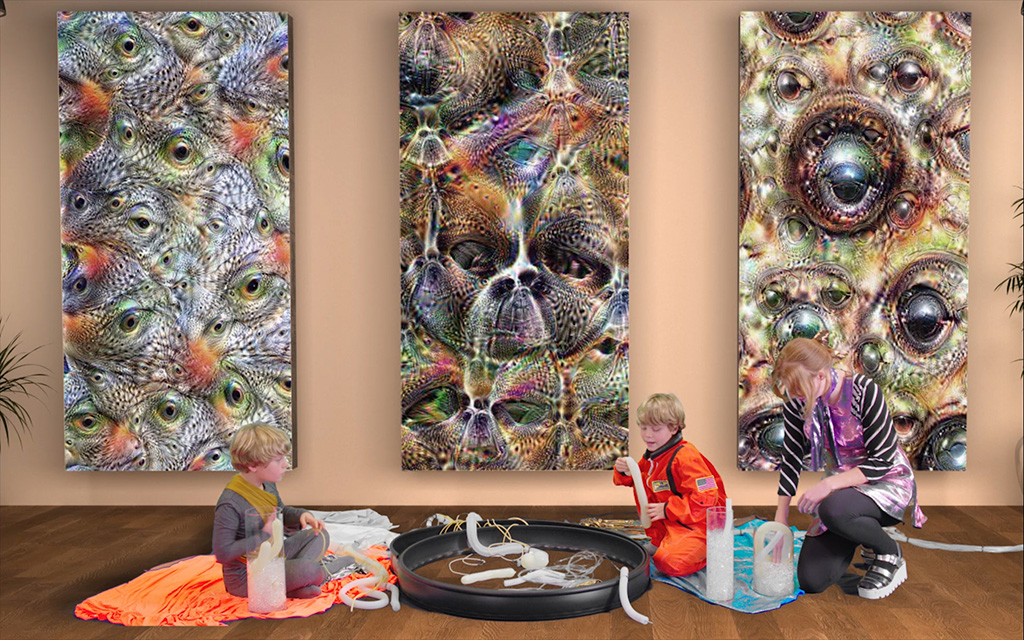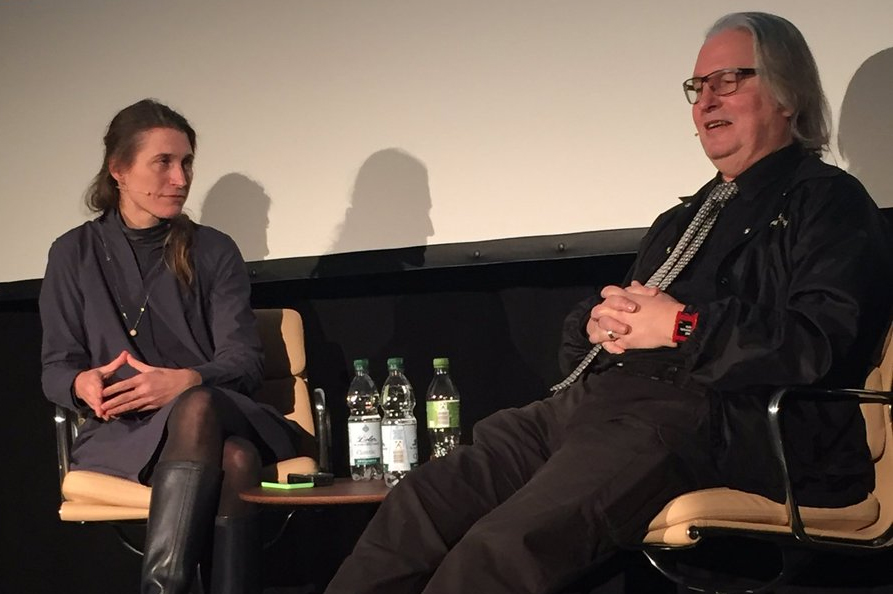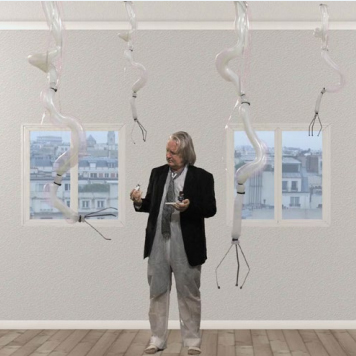UC San Diego Artists and Sci-Fi Author Unveil Video Installation for 'Hello, Robot' Exhibition in Germany
San Diego and Weil am Rhein, Germany, February 14, 2017 — The Arthur C. Clarke Center for Human Imagination – located in the Qualcomm Institute on the UC San Diego campus – is behind one of the art installations that opened over the weekend at the Vitra Design Museum in Weil am Rhein, Germany (four kilometers north of Basel, Switzerland). “Hello, Robot: Design between Human and Machine” runs from Feb. 11 through May 14, and noted science-fiction author Bruce Sterling opened the exhibition with comments on "Life with Robots" in a Feb. 10 conversation with curator Amelie Klein.

Sterling is affiliated with the Clarke Center, and he has a joint exhibit in the show with Clarke Center Director Sheldon Brown, a professor of Visual Arts at UC San Diego and founding co-PI of the Qualcomm Institute, the UC San Diego division of the California Institute for Telecommunications and Information Technology (Calit2).
The overall exhibition roams broadly through robotics, with exhibits on robots used in the home, in nursing care, and in industry, as well as computer games, media installations, and countless references from film and literature. The show displays the wide range of forms that robotics takes today and at the same time broadens awareness of the associated ethical, social, and political issues.
Sterling’s novels and stories have been highly influential in defining the cyberpunk genre. According to conference organizers, however, “less renowned is the fact that Sterling is also an acclaimed design expert.” In the conversation that opened the exhibition, he discussed how robots have become part of everyday life, how they impact the design of our environment, and what challenges and opportunities our society must anticipate.

Sterling and UC San Diego’s Sheldon Brown are represented among the more than 200 exhibits from the fields of design and art. Their joint 2017 video installation, “My Elegant Robot Freedom”, was developed during a residency that Sterling spent this fall at the Clarke Center in San Diego. During his residency, Sterling worked with Brown and other affiliates of the Clarke Center to “brainstorm on imagining the relationships we might have with an increasingly robotic world in the year 2041,” said Brown.
Sterling turned those musings into a short story, which was adapted by Brown and the Clarke Center into the video installation now on view at the German museum. The art work envisions “an automated apartment flexibly adapting and responding to the needs of its occupant. The story is based on new developments in the field of soft robotics, a research discipline that focuses on constructing robots from soft materials such as silicone, textiles or rubber.”

Brown and Sterling produced the video with the Clarke Center and a team including Lyndsay Bloom, Wes Hawkins, Erik Hill, Jon Paden, Ash Smith, Jasmina Tesanovic, Byron Pepper, Rosanna Viirre, Aleksander Viirre and Mitchell Wright. The project was supported, in part, by the Artists and Machine Intelligence project at Google.
“My Elegant Robot Freedom: Prop” is the title of a related installation by Brown and Hawkins that is currently on display at UC San Diego. It is part of the exhibition, “Harold Cohen: Creating Computational Complexity,” which opened on Jan. 19 and runs through Feb. 17 in the University Art Gallery and the Visual Arts Gallery in the Structural and Materials Engineering (SME) Building. Most of the works are computer-generated paintings by the late UC San Diego professor Harold Cohen (whose computer-generated paintings were displayed in an exhibition in the Qualcomm Institute’s gallery@calit2 in 2011).
The Prop installation currently exhibited on the UC San Diego campus was created by Sheldon Brown and Wes Hawkins. The pneumatically-operated robot was built as a prop for filming the video installation now on display in Europe. It showcases a new class of robot systems, based on addressable, interconnected membranes. The work suggests a new trajectory for art-making machines, which could be equipped with more sophisticated and flexible robotic limbs unimaginable during Harold Cohen's early work in artificial intelligence and autonomous computer-generated paintings.
Media Contacts
Doug Ramsey, (858) 822-5825, dramsey@ucsd.edu
Related Links
My Elegant Robot Freedom
“Hello, Robot” Exhibition at Vitra Design Museum
Clarke Center for Human Imagination
Harold Cohen: Creating Computational Creativity
“Collaborations with My Other Self” Gallery@Calit2 Exhibition Catalog (2011)

